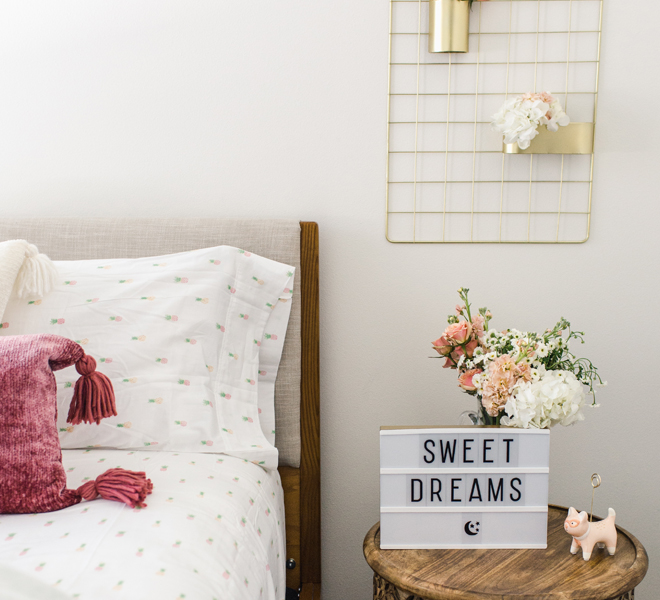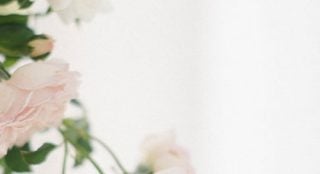Six Secrets to a Good Night’s Sleep

We all know we should be getting eight hours of sleep each night, but how do you make those eight hours restful enough that you wake up feeling rejuvenated? The time you spend in bed each night (or during the day—we’re always fans of a good nap!) allows your body to heal and recover, and it’s crucial for your brain to function at its peak. One of our editors recently read Why We Sleep: Unlocking The Power of Sleep and Dreams by Matthew Walker, which changed the way she looked at sleep, and now we’re switching up our bedtime routines to make sure we’re getting the 8 hours we need. In order to maximize our pillow time, we’ve found some simple ways to make falling asleep—and staying asleep—easier. From the light bulbs you use to your phone settings, here is are six tips for optimal sleep…
1. Invest in the right night light.
A good night’s sleep starts well before you turn out the light. If you like to read in bed, consider swapping out your regular lightbulb for one of these low blue light emitting light bulbs. Blue light suppresses the natural release of melatonin, a.k.a. the key to peaceful rest. When our eyes are exposed to too much blue light at night, our circadian rhythm is delayed, which makes it harder to fall asleep. These light bulbs will help your body stay on schedule, so you can fall asleep naturally.
2. Block out the light.
While we love natural light in every other part of our homes, in the bedroom, we recommend investing in some blackout curtains. This will give you the deepest sleep—just don’t forget to open them in the morning to get your day started! We love these curtains for a truly restful night, but when we’re traveling (or on nights where we need a little extra help falling asleep) we turn to a few different options to block the light. These night caps are one of our favorite ways to keep our eyes in the dark, but we also love this sleep mask for (practical) nighttime glamour.
3. Check your phone.
One of the hardest things to add to your pre-bedtime checklist (but one of the most effective for good sleep) is checking your phone at the door. Our phone screens are the biggest culprit when it comes to emitting sleep cycle disrupting blue light. Even when we’re using our phone to set an alarm for the next morning, our brains are stimulated and our body resets its circadian rhythm. Pick up a chic alarm clock or a natural light-based on so you don’t need to rely on your phone to wake you up and try to power off an hour or two before you turn in. And while you’re at it, try sticking to a consistent schedule for sleeping and waking. Not only will it make your nights better, but you’ll feel refreshed the rest of the day. Matthew Walker even suggests setting a bedtime alarm to ensure you turn in at the same time each night. For a complete tech detox, turn on “Night Mode” on your phone to lower the brightness and block blue light a few hours before bed.
4. No sound, no problem.
Much like light, sound can have a big impact on your sleep cycle. If you’re lucky enough to live in a quiet neighborhood, you may not need to worry about this as much, but for anyone who lives in a big city or on a busy block will know, finding the right noise cancelling devices is essential to waking up rested.
5. Keep your temperature in check.
There’s nothing worse than tossing and turning in the night in a too-hot room… except for shivering under a mountain of blankets. Before you go to sleep, make sure your room is at a temperature that feels comfortable and a little cool—this will help you fall asleep faster. Many experts recommend keeping the temperature set between 60 and 67 degrees F—cooler than you might think. Your body naturally loses heat as night approaches, so help it fall into its natural rhythm by keeping your room at a cooler temperature before bed. Make sure your sleepwear follows suit, and look for pieces that are lightweight but will keep you cozy.
6. See sleep through a new lens.
Raise your hand if you spend most of your day looking at screens. It’s pretty hard not to, but the increased amount of blue light you’re taking in can take a serious toll on your sleep cycle. Try a pair of blue light blocking glasses so that when it’s time to power down and climb into bed, you can fall into a deep sleep.
Do you have any other tips for a good night’s sleep?
Let us know in the comments so we can all maximize our beauty rest!
XO Team LC
Shop Sleep Products…
Shop Sleepwear…
Shop Bedding…
Photos: Kohl’s
Source: Why We Sleep: Unlocking The Power of Sleep and Dreams by Matthew Walker, Scientific American, WebMD
Affiliate links may have been used in this post.

